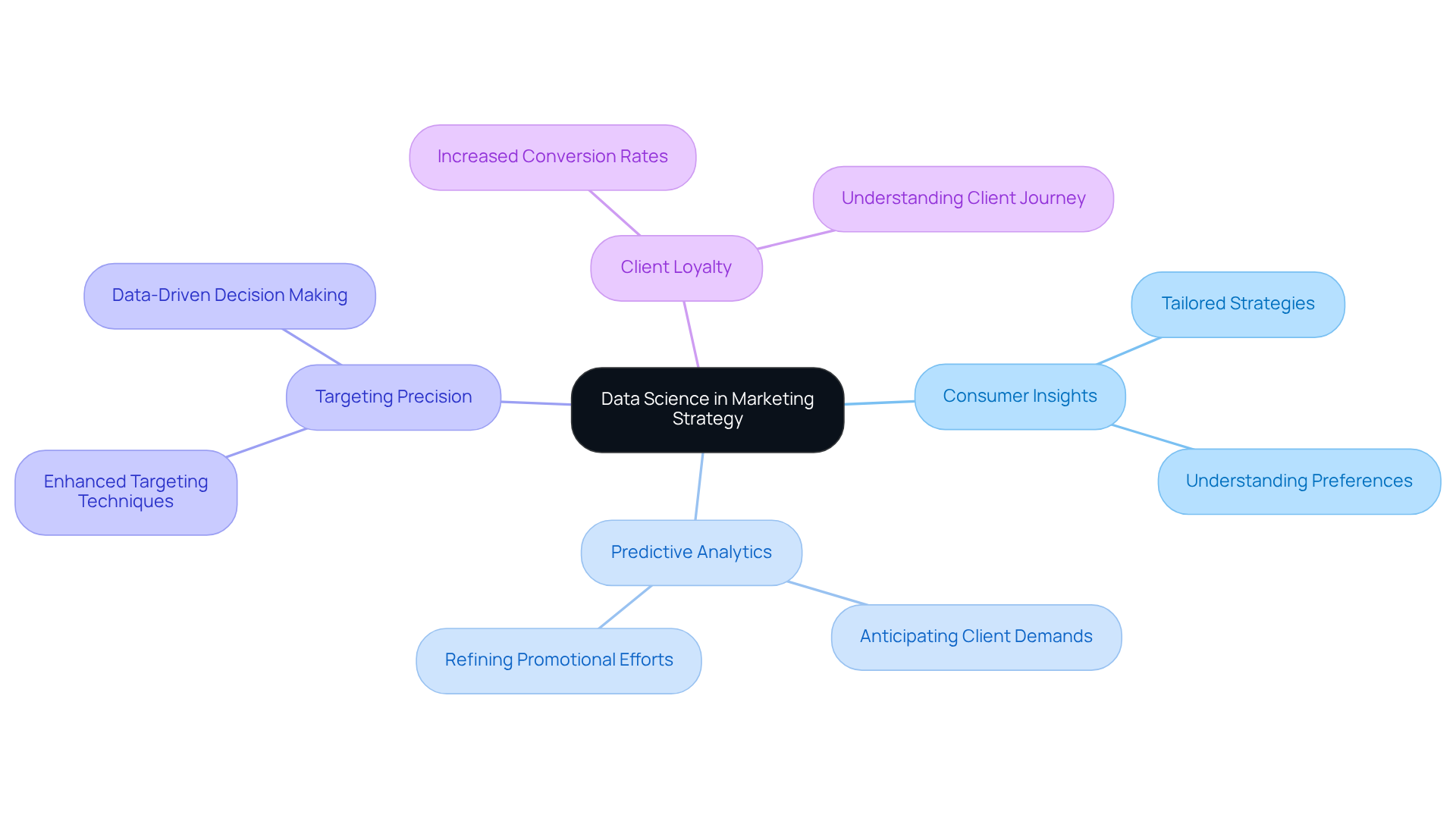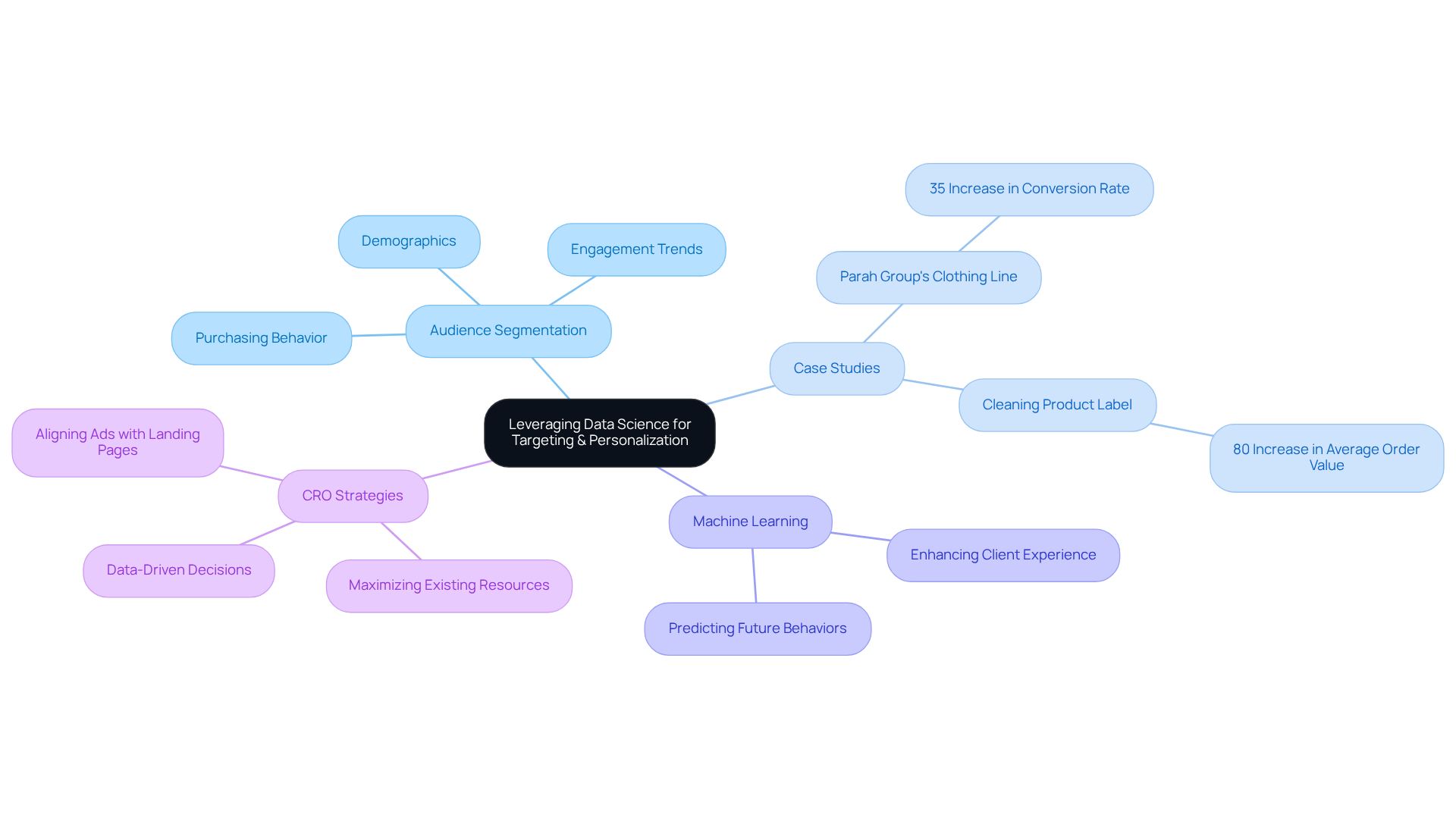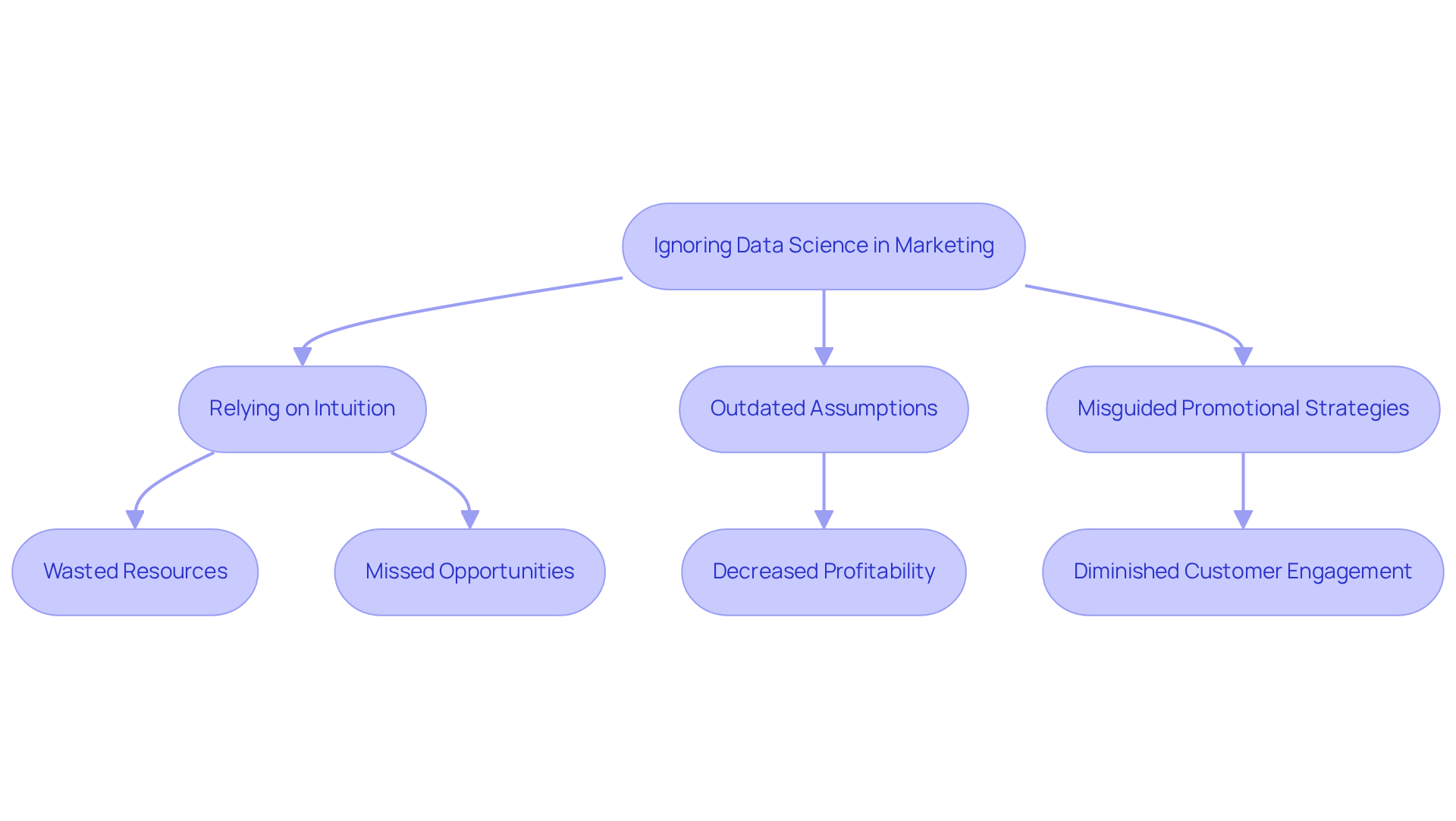
Overview
Marketing and data science are indispensable for direct-to-consumer (DTC) brands, empowering them to make informed decisions through comprehensive data analysis. This approach enhances targeting and personalization, ultimately driving profitability.
Leveraging consumer insights and predictive analytics is crucial for DTC companies, enabling them to tailor their strategies effectively. Such practices are vital for sustaining growth and maintaining a competitive advantage in an ever-evolving market landscape.
Introduction
The rise of direct-to-consumer (DTC) brands has fundamentally transformed the marketing landscape, making the integration of data science not merely optional but essential. By harnessing the power of data analytics, these brands gain invaluable insights into consumer behavior, enabling them to craft targeted and personalized marketing strategies that resonate deeply with their audience.
However, a critical question arises: what are the potential pitfalls for DTC companies that choose to overlook the importance of data-driven decision-making in their marketing efforts?
This exploration delves into the critical role of marketing and data science in shaping successful DTC brands, as well as the significant risks associated with ignoring this powerful synergy.
Establish Data Science as a Cornerstone of Marketing Strategy
In today's competitive landscape, marketing and data science are pivotal components of promotional strategies, particularly for direct-to-consumer (DTC) companies. The ability to collect, analyze, and interpret vast amounts of consumer data through marketing and data science empowers companies to make informed decisions that directly enhance their marketing effectiveness.
By providing insights into consumer behavior, preferences, and trends, marketing and data science enable marketers to tailor their strategies to meet specific needs. For instance, leveraging predictive analytics allows companies to anticipate client demands and refine their promotional efforts to align with these expectations.
This not only enhances targeting precision but also fosters a deeper understanding of the client journey, ultimately leading to increased conversion rates and enhanced client loyalty. As DTC companies face rising client acquisition costs, the integration of marketing and data science into their strategies becomes essential for achieving sustainable growth and profitability.

Leverage Data Science for Enhanced Targeting and Personalization
Marketing and data science empower DTC companies to significantly enhance their targeting and personalization strategies. By analyzing consumer data, companies can segment their audience based on various factors, including demographics, purchasing behavior, and engagement trends. This segmentation enables marketers to craft personalized messages and offers that resonate with distinct consumer groups. For instance, a DTC company might leverage data analytics to pinpoint a segment of customers who regularly buy eco-friendly products. By directing tailored marketing campaigns that emphasize sustainability toward this group, the company can boost engagement and drive conversions.
Moreover, extensive Conversion Rate Optimization (CRO) strategies, exemplified by Parah Group, can substantially elevate profitability. By concentrating on maximizing existing resources through rigorous testing, companies can make data-driven decisions that foster sustainable growth. Parah Group's by 35% through strategic homepage redesigns and optimized pricing strategies. Similarly, a $15M cleaning product label saw an impressive 80% increase in average order value by experimenting with free shipping thresholds and introducing product bundles.
Furthermore, machine learning algorithms can analyze past client interactions to predict future behaviors, enabling companies to deliver timely and relevant content that enhances the overall client experience. This level of customization not only boosts customer satisfaction but also fosters loyalty, making it an essential strategy for DTC companies striving to thrive in a competitive marketplace. By integrating these comprehensive, data-informed CRO approaches—such as aligning paid advertisements with landing pages—DTC companies can amplify their profitability and stimulate substantial revenue growth. In conclusion, the strategic application of data science and conversion rate optimization techniques is vital for direct-to-consumer companies pursuing sustainable growth and enhanced profitability.

Understand the Risks of Ignoring Data Science in Marketing
Ignoring marketing and data science in promotion poses significant risks for DTC companies. Without , companies may rely on intuition or outdated assumptions, leading to misguided promotional strategies that fail to resonate with their target audience. This oversight can result in wasted resources, missed opportunities, and ultimately, decreased profitability.
For instance, a company that neglects to evaluate client feedback may overlook crucial insights that could inform product development or marketing communications. Moreover, in an era where consumer preferences are rapidly changing, failing to adapt based on data can leave companies vulnerable to competitors who leverage analytics to stay ahead.
The repercussions of disregarding data science can be severe, including diminished customer engagement, lower conversion rates, and weakened brand loyalty. Therefore, for DTC brands striving for long-term success, it is essential to integrate marketing and data science into their strategies rather than just considering it advantageous.

Conclusion
The integration of marketing and data science is not merely a trend; it is a fundamental necessity for direct-to-consumer (DTC) brands striving to thrive in a competitive landscape. By leveraging data-driven insights, companies can refine their marketing strategies, ensuring they effectively address the specific needs and preferences of their target audience. This strategic alignment not only enhances engagement and conversion rates but also cultivates long-term customer loyalty, a crucial element for sustainable growth.
Several key points underscore the significance of this integration:
- The utilization of predictive analytics empowers companies to anticipate consumer demands.
- Detailed audience segmentation facilitates personalized marketing efforts that resonate with distinct consumer groups.
- Successful conversion rate optimization strategies exemplify the tangible benefits that emerge from a meticulous, data-informed approach.
Ignoring these insights may lead to misguided strategies, wasted resources, and ultimately, diminished profitability.
In a landscape where consumer preferences are in constant flux, the capacity to adapt through data science is paramount. DTC brands must acknowledge that overlooking this vital component of their marketing strategy can yield severe repercussions, including reduced engagement and weakened brand loyalty. Embracing data science not only equips companies to respond effectively to market demands but also empowers them to innovate and lead within their respective industries. Therefore, the call to action is unequivocal: integrating marketing and data science is essential for any DTC brand aspiring to achieve enduring success and profitability.
Frequently Asked Questions
Why is data science important for marketing strategies in DTC companies?
Data science is crucial for marketing strategies in DTC companies because it allows for the collection, analysis, and interpretation of large amounts of consumer data, enabling informed decision-making that enhances marketing effectiveness.
How does marketing and data science contribute to understanding consumer behavior?
Marketing and data science provide insights into consumer behavior, preferences, and trends, allowing marketers to tailor their strategies to meet specific consumer needs.
What role does predictive analytics play in marketing?
Predictive analytics helps companies anticipate client demands and refine their promotional efforts to align with these expectations, enhancing targeting precision.
How does a data-driven approach impact client conversion rates?
A data-driven approach fosters a deeper understanding of the client journey, which can lead to increased conversion rates and enhanced client loyalty.
Why is the integration of marketing and data science essential for DTC companies?
The integration is essential for DTC companies to manage rising client acquisition costs and achieve sustainable growth and profitability.
FAQs











